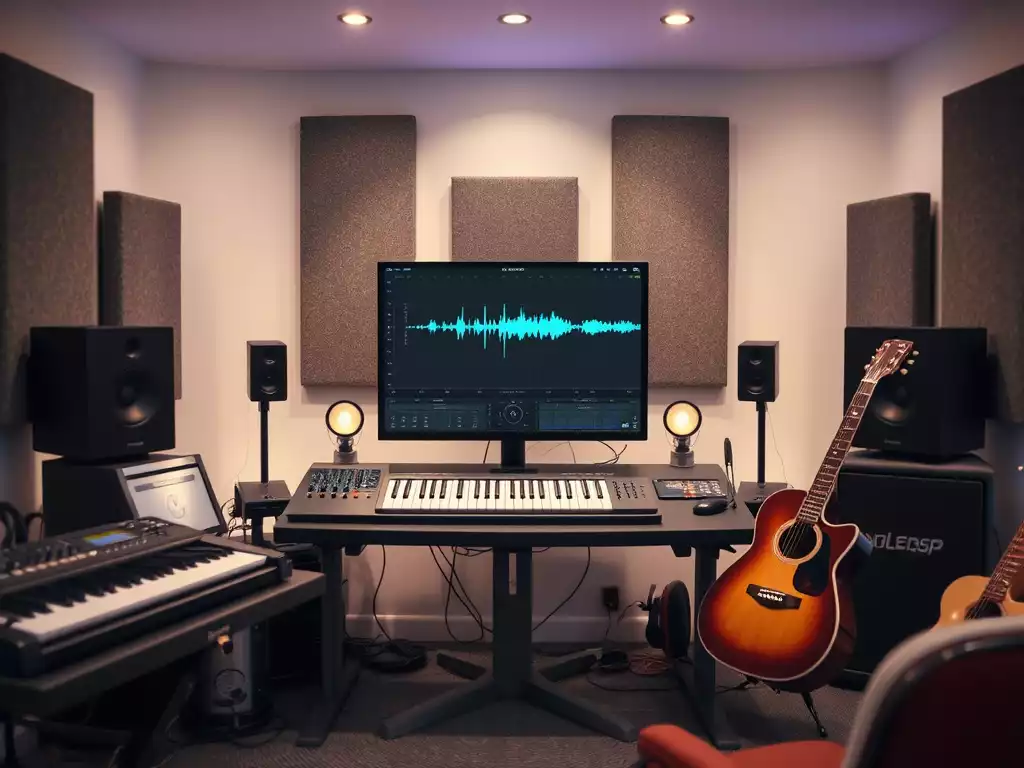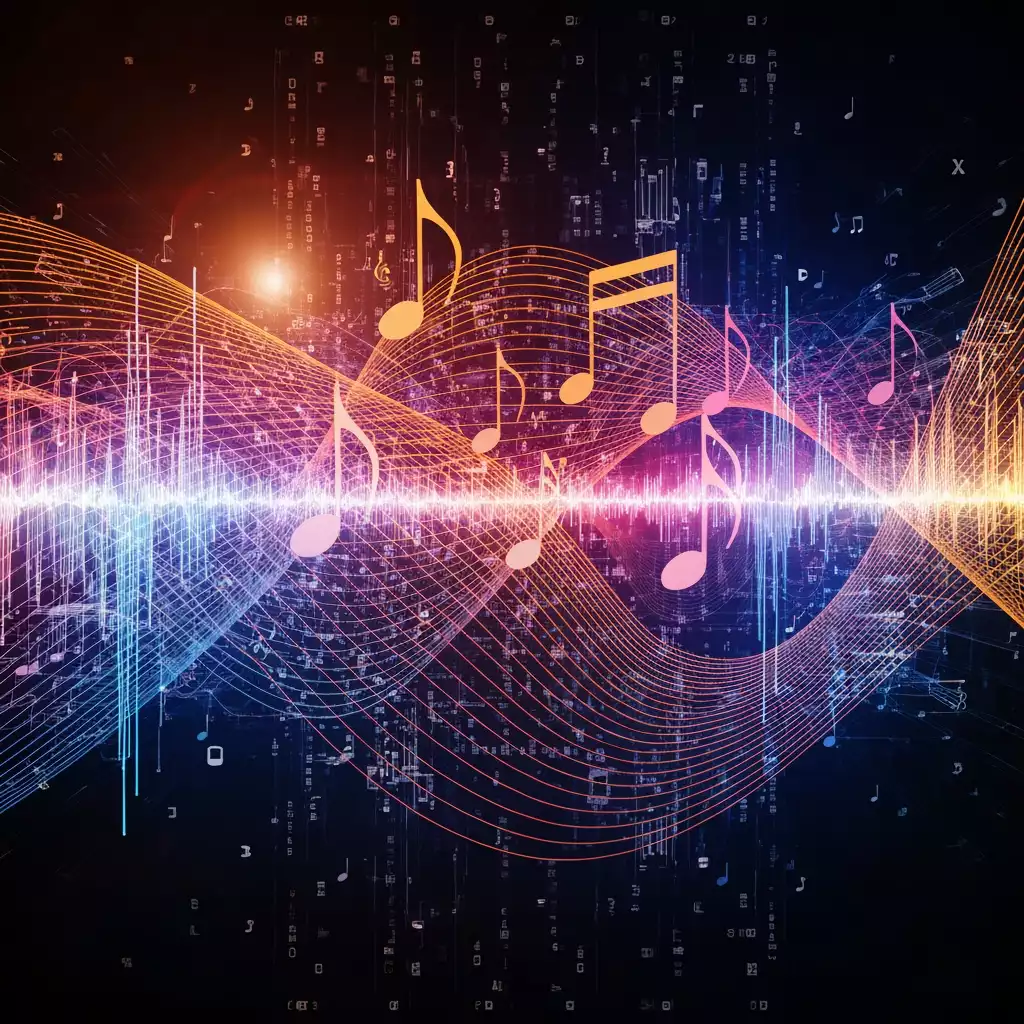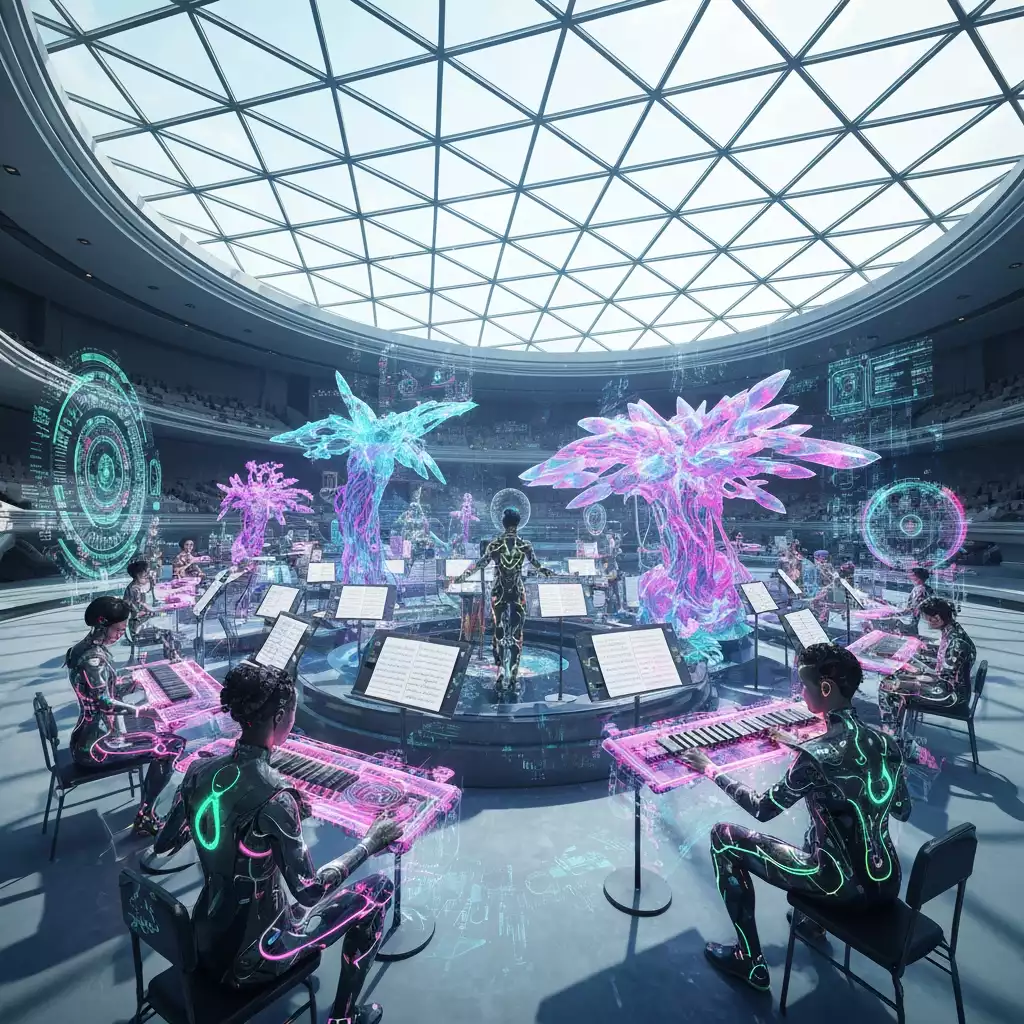As we stand on the brink of a musical revolution, the influence of AI on music creation is becoming undeniable. Imagine a world where artists collaborate seamlessly with intelligent systems, expanding the boundaries of creativity and sound. This evolution is not just about technology; it’s about reimagining the very essence of music itself.
What You Will Learn
- AI enhances music creation by generating original compositions and assisting in production processes.
- Key technologies like neural networks and voice cloning are revolutionizing how music is composed and produced.
- Emerging tools such as MusicLM and Flow Machines are set to redefine songwriting and sound generation.
- Platforms like DistroKid and SoundCloud offer opportunities for monetizing AI-generated music effectively.
The Evolution of AI-Generated Music: Transforming the Soundscape
The music industry has seen a remarkable transformation over the years, particularly with the introduction of AI technology. Today, AI plays a significant role in music creation, enhancing creativity and accessibility for artists and producers alike. From generating melodies to crafting entire songs, AI is reshaping the way we perceive and produce music.
As we look back, the integration of technology into music has evolved from simple electronic instruments to sophisticated AI systems capable of understanding and creating complex musical compositions. It’s fascinating to see how far we’ve come, and the journey is far from over! For a deeper dive into the technological advancements, you can refer to this detailed analysis on AI in music production.
Understanding AI in the Music Industry
AI’s role in the music industry is multifaceted, influencing everything from composition to production. Here’s a quick overview of how AI is integrated into various facets of music:
- Composition: AI can generate original music pieces based on specific parameters set by composers.
- Production: AI tools aid in mixing and mastering tracks, optimizing sound quality.
- Music Discovery: AI algorithms help listeners find new music tailored to their preferences.
These advancements have not only streamlined workflows for musicians but also opened up new avenues for creativity. The future of music creation is collaborative, where humans and machines work together to produce innovative soundscapes. The impact of AI on music production highlights how AI is becoming an indispensable tool for artists.
Key Technologies Behind AI Music Generation
Several key technologies enable AI to create music that resonates with listeners. Let’s delve into some of these technologies:
- Neural Networks: These systems mimic the human brain, allowing AI to learn from vast amounts of data and generate music that reflects different styles and genres.
- Chord Transcription AI: This technology analyzes songs and transcribes them into chords, which can then be used as a foundation for new compositions.
- Voice Cloning Technology: AI can replicate human voices, enabling the creation of vocals for songs without the need for a live singer.
These technologies are paving the way for a new era of music creation, where the possibilities are virtually endless. As AI tools continue to improve, we can expect even more exciting developments in the music landscape! Further insights into the creative potential and ethical dilemmas can be found in this article on AI’s impact on music production.
We Want to Hear From You!
How do you feel about the integration of AI in music creation? Are you excited about the possibilities it brings or do you have concerns about its impact on the music industry? Share your thoughts below:
Future Perspectives: What Lies Ahead for AI-Generated Music
As we look forward, the world of AI-generated music is set to evolve dramatically. Exciting trends and innovations are emerging that may reshape how we create and experience music. From more sophisticated algorithms to deeper integrations with music platforms, the future holds immense potential for both creators and listeners alike!
It’s fascinating to think about how much has changed in a few short years. We are witnessing a transition where AI not only assists in music creation but also collaborates with artists, bringing new sounds to life. By embracing these developments, we can redefine the boundaries of music creation.
Innovations to Watch: Emerging AI Music Technologies
In the coming years, several technologies are poised to revolutionize the AI music landscape. Here are a few key innovations to keep an eye on:
- MusicLM: This AI model promises to generate high-quality music from textual descriptions, allowing artists to describe their ideas and translate them into sound.
- Flow Machines: Utilizing AI to assist in songwriting, Flow Machines can analyze styles and create new compositions that reflect various influences.
- Beatoven: This tool focuses on generating background music tailored specifically for videos and podcasts, ensuring the right vibe for any project.
- OpenAI Jukebox: A model that can generate music in various genres, complete with vocals, showcasing the potential for rich and diverse audio experiences.
These technologies not only enhance creativity but also offer new avenues for personal expression in music. As we adopt these tools, we can expect an explosion of diverse music styles and genres, enriching the overall soundscape!
Frequently Asked Questions About AI in Music Creation
What is the main role of AI in music creation?
What key technologies are used in AI music generation?
What are some emerging AI tools for music creation?
How can artists monetize AI-generated music?
Is AI replacing human creativity in music?
Get Involved: How to Embrace AI-Generated Music
Now is the perfect time to dive into the world of AI-generated music. Whether you’re a seasoned musician or just starting out, there are numerous tools and platforms available to help you create and share your musical creations. Engaging with AI music tools can lead to exciting opportunities and unique artistic experiences.
I encourage you to explore these tools and find ones that resonate with your style! Sharing your experiences not only broadens your creative horizons but also contributes to a growing community of AI music enthusiasts.
Monetizing Your AI Music Creations with Platforms Like DistroKid and SoundCloud
Once you’ve created your AI-generated music, monetizing it is the next logical step. Here are some platforms you can use:
- DistroKid: This service helps artists distribute their music across various streaming platforms quickly and efficiently. It’s user-friendly and offers various plans to suit your needs.
- SoundCloud: Ideal for sharing your music with a community of listeners, SoundCloud also allows you to monetize your tracks through their various programs.
- Bandcamp: This platform not only helps musicians sell their music directly to fans but also offers tools for marketing and promotion.
By utilizing these platforms, you can effectively reach your audience and start earning from your AI creations. It’s all about finding the right fit for you and your unique sound!
Recap of Key Points
Here is a quick recap of the important points discussed in the article:
- AI’s Role: AI enhances creativity and accessibility in music creation, influencing composition, production, and music discovery.
- Key Technologies: Innovations like neural networks, chord transcription AI, and voice cloning technology are driving the future of music generation.
- Emerging Innovations: Tools like MusicLM, Flow Machines, and OpenAI Jukebox are set to revolutionize music creation with AI.
- Getting Involved: Musicians are encouraged to explore AI music tools to enhance their creativity and share their work.
- Monetization Options: Platforms like DistroKid, SoundCloud, and Bandcamp provide ways to distribute and monetize AI-generated music effectively.


